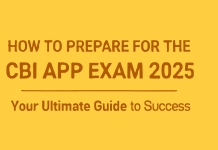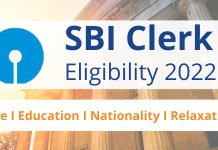Introduction
As the exam season approaches, the mental health of students and job aspirants can be negatively affected by anxiety and stress. Throughout their academic journey, whether in school or college, many students consistently experience exam-related fear, leading to unnecessary frustration, sleepless nights, and anxious days. According to a survey conducted in 2017, over 64% said fear of examinations was the main cause of their insomnia.

Exam and Stress
This fear can have a detrimental impact on students’ overall exam performance. While some levels of stress can be beneficial, providing motivation and focus during exam preparation, excessive stress and anxiety can impede concentration and lower self-esteem. In today’s competitive job market, the process of applying for a job is often accompanied by a series of tests and exams that candidates must undertake to demonstrate their competence and suitability for the position. However, this journey is not without its hurdles. It is fraught with challenges that can deeply impact job aspirants’ mental and emotional well-being. But it is possible to overcome the fear of exams.
As the RBI Grade B Exam 2023 results are out, it is important to know how to tackle the result stress and its outcome. No matter if you face success or failure, your mind will react in a certain way. The experience of not succeeding in the exam can be emotionally challenging and affect one’s motivation and self-esteem. Candidates who couldn’t clear the exam will feel disheartened and frustrated, leading to self-doubt. But you should always remind yourself that you are a ‘Baazigar’ and you’ve got this.
This blog explores the interconnected themes of resilience, self-doubt, and societal pressure, shedding light on the struggles faced by job aspirants during competitive exams.
At the end of this blog, you will find a surprise that will help you to analyze whether you’re a Baazigar and How to become one. So stay tuned…
Now let’s move forward with knowing about Exam Stress and its Management.
What are the Signs of Exam Stress?
Signs of exam stress can manifest in various ways, including:
· Social disconnection: Withdrawing from friends and activities that were once enjoyed.
· Emotional fluctuations: Feeling irritable, down, or overwhelmed.
· Indecisiveness: Struggling to make decisions.
· Appetite changes: Experiencing a loss of appetite or overeating.
· Sleep disturbances: Having trouble sleeping and finding it difficult to get out of bed.
· Lack of motivation: Finding it challenging to gather the drive to start studying.
· Physical tension: Experiencing tense muscles or headaches.
· Nervousness and physical sensations: Having clammy/sweaty hands, butterflies in the stomach, a racing heartbeat, or feelings of nausea.
· Nervous habits: Engaging in fidgeting, nail-biting, or teeth grinding.
· Cognitive difficulties: Feeling confused or experiencing a blank mind during tests.
These symptoms can significantly impact one’s enjoyment of life, particularly during exam periods.
Causes of Mental Stress Include:
Societal Pressure: The Weight of Expectations
As a government Job aspirant, you may face immense societal pressure, which stems from the expectations of family, friends, and society as a whole. There is a prevailing belief that success in job exams is an indicator of one’s intelligence, capability, and self-worth. This pressure often intensifies when candidates compare themselves to their peers, creating a constant fear of falling behind or not meeting societal standards. The constant comparison and judgment fostered by societal pressure contribute to heightened stress levels, anxiety, and a diminished sense of self-confidence.
The pressure to succeed can be particularly overwhelming in cultures where job performance is closely tied to one’s identity and social standing. Candidates may feel compelled to achieve a certain level of professional success to gain recognition and acceptance within their communities. Consequently, the fear of disappointing others or facing criticism adds an extra layer of pressure, making the job exam experience even more challenging.
Self-Doubt: Internal Struggles and Limiting Beliefs
Self-doubt is an internal battle that plagues many job aspirants during the exam process. Candidates often question their abilities, qualifications, and skills, fearing that they may not measure up to the expectations of employers and casting doubt upon their own potential. This self-doubt can arise from various factors such as previous failures, imposter syndrome, or a lack of confidence due to the competitive nature of the job market. These factors erode the candidates’ belief in themselves and their capacity to excel, making it difficult for them to perform at their best during job exams.
Imposter syndrome, in particular, can have a profound impact on job aspirants. It involves persistent feelings of inadequacy and the fear of being exposed as fraud, despite evidence of competence and accomplishments. The perception of not being deserving of success or believing that one’s achievements are merely the result of luck or external factors can undermine self-confidence and hinder performance in job exams.
Strategies for Managing Exam Stress and Combat Challenges
a. Developing Self-Awareness:
Job aspirants must cultivate self-awareness to recognize and acknowledge their strengths, weaknesses, and limitations. Understanding oneself better allows individuals to confront self-doubt and work towards personal growth, capitalizing on their strengths while addressing areas that need improvement.
b. Preparation:
Thorough preparation is the key to reducing anxiety and building confidence. Engaging in research, practicing mock exams, and seeking feedback can help candidates feel more prepared and competent, alleviating some of the self-doubt associated with performance.
- Establish a clean and quiet workspace with easy access to necessary materials.
- Familiarize yourself with the exam format by reviewing past exam papers, if available.
- Seek clarification from your teacher if you have any uncertainties about the exam or its content.
- Create a visual “mind map” to organize information and make connections using bright colors to aid memory.
- Develop a clear study plan, breaking down tasks into manageable chunks, and focus on one task at a time.
c. Establishing a Support System
Building a support system consisting of friends, family, or mentors is crucial for job aspirants. These individuals can provide encouragement, guidance, and a safe space to share concerns and doubts. Consider seeking help from a friend or family member for summarizing key points or practicing oral presentations. Supportive networks help to counteract self-doubt and provide much-needed emotional support throughout the exam process.
d. Adopting a Growth Mindset:
Job aspirants should strive to adopt a growth mindset, viewing challenges as opportunities for learning and growth rather than as unachievable obstacles. Embracing a growth mindset allows individuals to approach job exams with a positive attitude, fostering resilience and diminishing self-doubt.
e. Prioritizing Self-Care:
Taking care of one’s well-being is vital during the job application process. Engaging in activities such as exercise, mindfulness, pursuing hobbies, and spending time with loved ones can help manage stress levels and maintain overall well-being. Self-care nurtures resilience by providing a healthy balance and allowing aspirants to recharge and approach exams with a clearer mindset.
- Allow yourself sufficient rest and relaxation time. Take relaxing breaks of 10-15 minutes. at every 1-1.5 hours of study, instead of working continuously.
- Minimize consumption of energy drinks or stimulants and opt for water or juice instead. Also, avoid junk food as it provides a temporary energy boost followed by fatigue.
- Implement a well-balanced diet to support your overall well-being.
- Reward yourself for achieving study goals, such as enjoying an episode of your favorite TV show or engaging in a fun activity or even enjoying your favorite dessert!
- Stay focused on your studies by minimizing distractions with a conscious effort.
After completing an exam, take a break to relax and engage in enjoyable activities before moving on to preparation for the next exam. Promoting well-being and reducing stress during this intense period is crucial, and incorporating self-care routines is key.
Visualize Success:
Visualization is a powerful technique that can enhance your exam performance. Set aside a few moments each day to visualize yourself confidently navigating the exam, answering questions accurately, and achieving your desired outcome. Envision the sense of accomplishment and pride that accompanies the successful completion of the exam. Visualizing success helps reduce anxiety and fosters a positive mindset, reinforcing your belief in your abilities.
Challenge Negative Thoughts:
Negative thoughts and self-doubt can hinder your exam performance. Stay mindful of any negative self-talk or limiting beliefs that arise. Challenge them by reframing them with positive affirmations. Remind yourself of your capabilities and strengths. For instance, replace “I’ll never understand this” with “I am capable of learning and grasping complex concepts.”
How do I handle Success and Failure?
Effectively managing success and handling poor performance in exams can be challenging, but it’s important to approach it with a positive perspective and a proactive attitude. Firstly, it’s crucial to acknowledge your emotions like recognizing your achievements and preparing for future endeavors or permitting yourself to feel disappointed or frustrated, by failure. Take some time to process those emotions, but avoid dwelling on them excessively. Instead, focus on learning from the experience and identifying areas for improvement or view failure as an opportunity for growth and learning.
Here are some steps you can follow to handle success in exams:
Acknowledge and rejoice:
Take a moment to acknowledge and appreciate your accomplishments. Recognize the effort, hard work, and dedication you invested in your exam preparation. Celebrate your success by treating yourself to something enjoyable or sharing the good news with friends and family.
Reflect on your achievements:
Reflect on what contributed to your success during your exam preparation. Identify the study techniques, strategies, or habits that worked well for you. This reflection will help you understand your strengths and allow you to replicate effective methods in future exams.
Identify areas for growth:
Despite your success, there may still be areas where you can improve. Analyze the topics or concepts that posed the greatest challenges during your exams. By identifying these areas, you can create a plan to address them and strengthen your knowledge for future exams.
Set new goals:
Now that you have succeeded in your exams, it’s crucial to set new goals. Determine what you want to achieve in your academic journey or future exams. Set clear, realistic goals that will keep you motivated and focused on continuous improvement.
Maintain consistency:
Guard against complacency caused by success. Continue to maintain a consistent study routine and remain disciplined in your approach. Consistency is key to sustaining success and attaining long-term academic goals.
Seek feedback:
Reach out to your teachers, professors, or mentors and request feedback on your performance. Their insights can provide you with a better understanding of your strengths and areas for improvement. Utilize this feedback constructively to enhance your study methods and exam strategies.
Support others:
Share your knowledge and experiences with others who can benefit from your success. By tutoring or mentoring fellow students, you not only reinforce your own understanding of the subject matter but also foster empathy and support within your academic community.
Take care of yourself:
Remember that success in exams should not come at the expense of your well-being. Prioritize self-care by getting adequate rest, consuming nutritious meals, engaging in regular exercise, and participating in activities you enjoy. Taking care of your physical and mental health will help you maintain balance and perform better in future exams.
Here are some tips for dealing with failure in exams
Acknowledge and accept your emotions:
Experiencing feelings of disappointment, frustration, or sadness after failing exams is normal. Allow yourself to recognize and accept these emotions. Give yourself permission to feel them, but avoid dwelling on them excessively.
Analyze and comprehend the reasons:
Take time to analyze and understand why you experienced failure. Reflect on the possible reasons for the poor performance, such as lack of preparation or specific challenges you encountered like gaps in understanding certain topics, or ineffective study strategies. Use this self-reflection as a starting point to develop a plan for future exams, incorporating more effective study strategies and seeking additional support if needed. Identifying the root causes will help you identify areas for improvement.
Seek feedback and guidance:
Reach out to your teachers, professors, or mentors to seek their feedback on your performance. They can provide insights into where you went wrong and offer guidance on how to improve. Embrace their feedback constructively, using it as a stepping stone toward future success.
Learn from your mistakes:
Failure offers an opportunity to learn from your mistakes. Identify the specific areas where you struggled and develop a plan to address them. Consider adjusting your study methods, seeking additional resources, or enlisting the help of tutors or classmates.
Adapt your mindset:
Maintaining a positive and growth-oriented mindset is essential. Instead of perceiving failure as a setback, view it as a stepping stone toward improvement. Embrace a temperament that emphasizes learning, resilience, and perseverance.
Set realistic goals:
Set new goals for yourself, taking into account the lessons you learned from your failure. Break down these goals into smaller, manageable tasks and create a study plan that aligns with your objectives. Setting realistic and achievable goals will help you regain confidence and motivation.
Practice self-care:
Dealing with failure can be emotionally draining, so prioritize self-care. Take breaks, engage in activities you enjoy, and practice self-compassion. Taking care of your well-being will help you maintain a positive outlook and bounce back stronger. Remember that setbacks are a part of the learning process, and it’s essential to maintain self-belief and perseverance.
Seek support:
Reach out to friends, family, or support networks for encouragement and support. Sharing your experiences and frustrations can provide a sense of relief and help you gain perspective. Surround yourself with people who uplift and motivate you. Finally, seek guidance from teachers, mentors, or tutors who can provide valuable insights and help you create a roadmap for success in future exams.
Keep in mind that success in exams is just one aspect of your academic journey and failure in exams does not define your worth or potential. Instead, it presents an opportunity to learn, grow, and improve. Strive for continuous improvement, and personal growth, and adopt a holistic approach to education. With the right perspective, you can always bounce back and achieve success in future exams.
At the beginning, we had promised that at the end of this blog, you will be able to analyze whether you are a Baazigar and How to become one. Congratulations! Because now you’ve reached the stage where we are going to reveal that surprise for you.
Baazigar : An initiative to prioritize the mental health of every aspirant
Every time when a result gets announced, aspirants face a state of self-doubt, stress, and anxiety. Our mind is the home to various chemical reactions for every situation whether it is happiness, sadness, fear, or anxiety. It is important to balance out those reactions with some simple tactics.
At ixamBee, we understand the importance of Mental Health. Hence we‘ve come up with a Mental Health Workshop in collaboration with Lissun, an online Mental Health Counselling Platform. Here, you will get an opportunity to interact with and learn from wise Mental health Experts who will talk to you about coping with exam stress, fear of dejection, and anxiety. So get ready to indulge in the world of positivity and good Mental Health.













